Our Mission
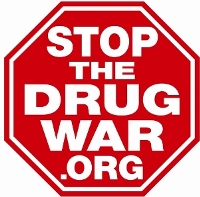
How We Work
StoptheDrugWar.org is a primarily US-based organization that advocates on domestic drug policies and in the international sphere. We pick advocacy issues for which there are unfilled roles in which we and coalition partners can make a difference. One in which we played a leading role for over a decade was a successful effort to repeal a law that denied financial aid for college because of drug convictions.
Since our founding in late 1993, we have also focused on providing information. Under our previous (and still official) name, Drug Reform Coordination Network (DRCNet), we pioneered use of the internet for educating and organizing in drug policy reform. We still do this through Drug War Chronicle, the only online newsletter to comprehensively cover all areas of drug policy and reform, published continuously since 1997. Click here for some examples of how people put our newsletter to use.
At StoptheDrugWar.org we take an intellectual approach to issues, while acknowledging that our role as advocates sometimes constrains our choices. We seek to recognize and address points in the drug policy discussion on which reasonable and informed people may sometimes disagree with us. We strive to understand and communicate about the complexities of issues, not just recite talking points, as format and the needs of each situation permit.
Our Issues
Some of the issue areas we engage in are criminal justice reform, marijuana legalization, harm reduction / public health programs, medical access to drugs, decriminalization of drugs, human rights and rule of law in drug policy, and reform of international drug treaties.
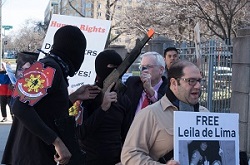 | |
Our 2018 protest supporting Philippine |
We also believe big-picture in ending the criminal prohibition of drugs, replacing it with a thoughtful and cautious system of regulation (e.g. some form of legalization) accompanied by health and social programs. (More on this below.)
In recent years we have engaged extensively in drug policy at the United Nations, and in international human rights and democracy advocacy, particularly in relation to the extrajudicial killings that have taken place in the Philippine drug war since 2016. We have most recently engaged a worker safety issue in state-legalized cannabis (marijuana), namely armed robberies of cannabis stores, a problem driven principally by cash reliance in the stores, due to the limitations in financial services available to the still federally-illegal industry.
Our Political Approach
Drug policy reform is an issue that draws support from a wide range of the political spectrum. Since StoptheDrugWar.org's founding we have sought common cause, cultivated friendships and forged alliances with good people of all kinds.
Other movements with which we traditionally align as part of the drug policy reform movement include civil liberties and civil rights, HIV/AIDS, criminal justice reform and human rights. Through our work on extrajudicial killings in the Philippine drug war, we now also engage extensively with global issues affecting events in that country, as part of this aligning with movements for democracy, international justice and countering disinformation.
Though the largest number of supporters for US reform efforts have been from the Democratic, liberal or progressive side, our movement has always had important supporters on the libertarian right or from other thinking conservatives. This political diversity is seen especially in sentencing reform, which routinely today gets identified as one of a few areas of active bipartisan cooperation. But we sometimes find support even for legalization efforts, and in other areas like human rights, ending police paramilitarization and due process.
We are in a time of special challenges. Intellectual deterioration on the political right has contributed to problems like racism, distrust of science, and Trumpist authoritarianism. Right-leaning communities today are principle targets of disinformation campaigns on matters like elections, the COVID-19 pandemic and climate change. Political discourse in such communities is often marked by resentments influencers have fostered against media, rival political movements, social justice advocates and others.
There are still responsible figures on the right, but they are fewer in number. We applaud their efforts to offer positive leadership within the compromised environment they have to contend with today. We value our continued friendships on the right, and work with responsible allies as we are able.
The political left has seen the rise of inspiring new movements for policing and criminal justice reform, particularly the Movement for Black Lives. This long-awaited awakening has expanded the window of what's possible. So has the energetic surging of the progressive movement.
These positive developments have also been accompanied by an increased degree of perceived tension between big picture goals and incremental reforms. Legislation that would reduce prison sentences, or which aims to reduce fatalities in police encounters, for example, sometimes prompts opposition from within progressive or radical circles who prefer bills that go further, or even prompts attacks on the advocates of the reforms. In drug policy reform, some organizations have opposed moving legislation to legitimize banking services for the marijuana industry, unless combined with measures promoting equity in ownership of cannabusinesses or other social justice measures.
These differences sometimes get cast as reflecting approaches taken by paid lobbyists who want to demonstrate progress to their supporters while maintaining good relationships with legislators, vs. the needs and views in communities actually affected by the injustices. Such claims, however, often mask what's more accurately understood as competition over strategy and influence within the affected communities.
We don't think people should be attacked for working to get people out of prison. We disagree with advocacy approaches that stand in the way of providing achievable relief to people facing sentencing hearings or serving unconscionably long prison sentences now, or of other ways to make people safer and relieve their suffering in the present.
Our experience, such as with the aforementioned drug conviction / student aid campaign, bears out our view that incremental reform is not inherently in tension with larger reform. Without viewing it in absolute terms, we adhere to the most prevalent view among advocates and in the political class, that smaller changes tend to make larger changes more likely. We see the ethical burden of proof as lying with those who argue the opposite to oppose the politics of the possible. Such proof, or short of it the ability to make sound judgment calls, requires rigorous analysis of the politics and legislative process in any specific issue at hand.
Our Values
- We value facts and analysis over talking points.
- We engage in intelligent and well-informed dialogue, not over-simplification or polemic.
- We have big visions and goals, and we speak directly about them, but without making the perfect the enemy of the good.
- We feel a moral obligation in most cases to support partial or incremental changes that help people, even when they may seem to be in tension with larger goals.
- We seek to work with many different kinds of people.
- We view media coverage as a means to achieving social justice and policy reform, not an end in itself.
- We recognize our fallibility as human beings, seek to identify when we fall short of these values and why we fell short, and to learn from that.
The Cause
David Borden discusses decriminalization and |
Why stop the drug war? Why legalize drugs? There are many different parts of our answer to this complex issue. For marijuana, the substance's relative degree of safety make prohibition hard to justify, as most Americans have come to feel. Along with the benefits that go with governmental regulation, research evidence is emerging for a substitution effect of marijuana vs. opioids, leading to fewer overdoses and less addiction to heroin or prescription drugs in states with legal or medically available marijuana.
For more dangerous or addictive drugs, the case is somewhat different. Legalization advocates often believe in the libertarian arguments, but most don't rely on them. We see prohibition as causing damaging street crime that fuels poverty and other problems, most seriously in the inner cities; and as fueling insurgencies and threatening criminal organizations in source or transit countries, especially where states and the rule of law are weak.

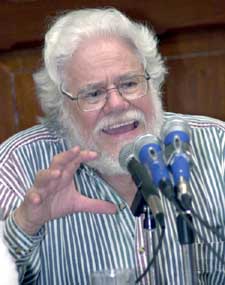
In late 2001 StoptheDrugWar.org launched "Out from the Shadows: Ending Drug Prohibition in the 21st Century," a global campaign and conference series. The lead event took place in Mérida, Mexico, drawing 300 attendees including legislators from seven countries. At the time Out from the Shadows Mérida featured the most extensive high level political participation ever seen at a drug policy reform conference.
Stopping the drug war is an issue of justice reform, civil rights, civil liberties, human rights, public health, and freedom. Along with organizations working in all those areas, StoptheDrugWar.org aligns with groups like the Global Commission on Drug Policy, statements of principle like the Vienna Declaration, the campaigns that have fielded marijuana legalization initiatives in states throughout the US, and many others.
Our Programs
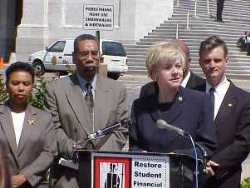
In 2014 we began work related to the April 2016 "UN General Assembly Special Session on the World Drug Problem" (UNGASS), organizing a coalition of hundreds of NGOs, as well as some businesses, calling for a human rights-based approach to global drug policy. The statement also argued the case for revision of the UN drug control treaties in a time when nations are moving toward legalization systems, as well as justifying legalization moves on the basis of human rights even in advance of treaty reform.
Major NGOs such as Human Rights Watch and the American Civil Liberties Union were among the signatories of our sign-on statement for UNGASS and a sign-on letter addressed to President Obama. We also organized a teleconference for media featuring legislators from Canada and Mexico on prospects for marijuana legalization in those countries.
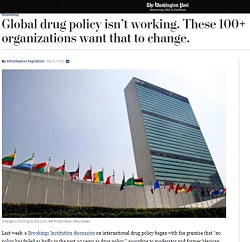 | |
WashingtonPost.com story on our |
In March 2017 we organized a side event on extrajudicial killings in the drug war, focusing on the situation in the Philippines, at the UN Commission on Narcotic Drugs meeting in Vienna. Vice President Leni Robredo of the Philippines sent a speech by video for the event, which criticized the killings and other aspects of President Duterte's drug policies. (Robredo was attacked in the media by the president's spokesperson and by the Speaker of the Philippine House of Representatives, among others, leading to a high-profile but unsuccessful drive to impeach her.)
We have continued our advocacy on the Philippines since that time, and expanded it to other countries suffering Duterte-imitation drug war killings. We are working to expand it to a more general drug policy and rule of law program. As part of this we participate with other NGOs in efforts with the Coalition for the International Criminal Court and the GloMag Coalition.
In December 2022 we published the report, authored by our executive director David Borden, "Dangerous Delays: What Washington (Re)Teaches Us About Cash and Cannabis Store Robberies." Dangerous Delays is the first published study of characteristics armed robberies targeting state-legal marijuana stores. It aims to help secure passage of the SAFE Banking Act, while informing Congress, advocates and communities on what more will be needed to protect marijuana store workers from robberies.
HISTORY: From 1998 through 2006, StoptheDrugWar.org organized a nationwide campaign to repeal a law that delays or denies college aid to students because of drug convictions. Much of our work on that campaign consisted of building a national coalition made up of hundreds of organizations opposed to the law. Also as part of the student aid/drug conviction campaign, StoptheDrugWar.org sponsored the John W. Perry Fund scholarship program to assist students affected by the law.
In late 1998, the organization launched the Higher Education Act Reform (HEA) Campaign, opposing a law passed that year taking financial aid away from students because of drug convictions. Ten members of Congress participated in a press conference organized in 2002 by DRCNet under the umbrella of the Coalition for Higher Education Reform, a record still in place for a drug policy reform press conference.
The coalition achieved a partial reform to the law in 2006, when it was limited to offenses committed while a student is in school and receiving federal aid – one of only a few scale-backs to the federal drug war to date. A further reform that would have further limited the law's reach to sales convictions passed the House of Representatives, but the section of the education package that contained the language was removed when Democrats combined it with health care reform in 2010 as part of their strategy to pass both bills. In 2020 the law was fully repealed as part of the December COVID relief and spending bill.
Through the HEA campaign, together with outreach on our email list and the work of our staff and student partners, we launched Students for Sensible Drug Policy (SSDP) into an independent national organization. Media outreach conducted jointly by the two organizations from 1999 through 2002 garnered coverage in most national media outlets. StoptheDrugWar.org also sponsored a scholarship fund supporting students losing aid under the law, the John W. Perry Fund, honoring a widely admired police officer who lost his life at the World Trade Center, who had been active in the drug policy reform movement.
People
Staff | Directors | Advisors | UN Representatives
Staff
David Borden, Executive Director
David Borden is founder and executive director of StoptheDrugWar.org. Borden played the leading role in pioneering use of the Internet for education and organizing in drug policy reform after founding StoptheDrugWar.org (known then as DRCNet, short for Drug Reform Coordination Network) in late 1993. Borden oversaw the organization's work on the Higher Education Act Reform Campaign, an effort to repeal a federal law that denied students financial aid because of drug convictions until its repeal in December 2020. He has initiated programs including the John W. Perry Fund scholarship program, the Out from the Shadows international conference series, the organization's work on UN drug policy, and international advocacy to stop the drug war killings in the Philippines.
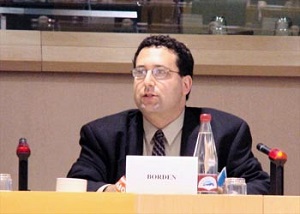
Borden published two academic journal articles in 2014 discussing aspects of the prohibition debate, including "If Hard Drugs Were Legalized, Would More People Use Them?" in the Cardozo Public Law, Policy & Ethics Journal, and "Drug Prohibition and Poverty" in the Brown Journal on World Affairs.
Borden earned an A.B. with honors in Astrophysical Sciences from Princeton University in 1988 and completed an M.M. in Jazz Composition from New England Conservatory in 1990. He is a native of Englewood, New Jersey, one of the first communities in the state to achieve racial integration in its school system. Borden is also a member of the Boards of Directors of Common Sense for Drug Policy and the Flex Your Rights Foundation, and of the Students for Sensible Drug Policy (SSDP) Council of Advisors; and he is the namesake of the annual "Dave Borden Friend of SSDP Award."
Phillip S. Smith, Writer/Editor
Phillip S. Smith has served as writer and editor of the Drug War Chronicle newsletter since May 2000. He has reported from the opium fields of Afghanistan and the coca fields of Bolivia and Peru, as well as the US-Mexico border and the mean streets of North American cities from Vancouver to Washington, DC. In addition to the Drug War Chronicle, he has written on drug policy issues for High Times, Cannabis Culture, The Fix and other outlets. He also currently serves as drug policy editor for Alternet.

He is also a long time drug policy activist, having helped to found one of the first NORML chapters in the state of South Dakota. He has been involved in local drug reform efforts in Austin, TX and Washington, DC, including the DC Metro chapter of NORML, and is currently involved in reform efforts in Northern California, where he currently resides.
Board of Directors
David Borden
President and Director, DRCNet Foundation
President and Director, Drug Reform Coordination Network
Michael Krawitz
Director
Michael Krawitz is a disabled United States Air Force Veteran [Sergeant, 1981 - 1986] who serves as Executive Director of Veterans for Medical Cannabis Access [VMCA] as well as in other board and advisory roles.

As a result of Krawitz's advocacy on this issue, the Department of Veterans Affairs revised its pain management system, removing the "pain contracts" in favor of a more flexible policy based upon informed consent. As VMCA's leader, Krawitz successfully negotiated the first ever VA medical cannabis policy in 2010 and has since directed the nationwide effort to add Post Traumatic Stress as a qualifying condition under state medical marijuana access laws.
Krawitz also currently serves as a leader of the Working Group on Medicinal Access to Cannabis, which is in the final stages of the critical review process of the World Health Organization Expert Committee on Drug Dependence.
Marco Perduca
Director
Marco Perduca was a Senator in the Italian Parliament from 2008 to 2013. He served on the Foreign Affairs, Justice, and Human Rights committees.
Perduca is an expert on UN mechanisms, with an emphasis on drug policy reform. For 20 years he coordinated the activities of the Nonviolent Radical Party at the United Nations in New York, as well as in Geneva and Vienna, and currently does so for the organizations Luca Coscioni Association and Science for Democracy. He has organized high-level meetings to abolish the death penalty in Africa and Central Asia, and has collaborated with British law firms and several American foundations on ending human rights violations in Italy.
Perduca's letters and opinions have appeared in the International Herald Tribune, The Financial Times, The Wall Street Journal, and The Guardian. When he was in Parliament, he was often a guest on the BBC as a commentator on Italian politics.
In 2014, Perduca published Operazione Idigov, a chronicle of his activities at the United Nations in the year 2000. In 2018, he co-curated Proibisco Ergo Sum, a collection of essays on prohibitions in Italy, and prefaced La Cannabis Fa Bene alla Politica and Terapie Stupefacenti. He has a blog on the Huffington Post's Italian language site, and in 2020 published a memoir, Farnesina Radicale.
Joey Tranchina
Treasurer and Director, DRCNet Foundation
Treasurer and Director, Drug Reform Coordination Network
Joey Tranchina, MA, is an award-winning photographer, a writer, poet and teacher. He founded and served as Executive Director of the AIDS Prevention ACTION Network (APAN), a syringe exchange outreach project in Silicon Valley in California, from 1989-2011.
Tranchina lives in Séte, France, where he writes & makes photographs, while trying to see Africa from his balcony.
Board of Advisors
Betty Aldworth, Multidisciplinary Association for Psychedelic Studies
Mohammad Ashrafuzzaman, Asian Human Rights Commission, Hong Kong
Justine Balane, Philippine human rights advocate
Rick Doblin, Multidisciplinary Association for Psychedelic Studies
Major Neill Franklin (ret.), Law Enforcement Action Partnership (LEAP)
David Hadorn, MD
Heather J. Haase, LL.M, Co-founder, International Drug Law Advocacy & Resource Center
Jon Holmes, Northampton, MA
Khurshid Khoja, Greenbridge Corporate Counsel
Kris Krane, Founder, 4Front Ventures
Pamela M. Lichty, MPH, Drug Policy Forum of Hawaii, Honolulu, HI
Jason Ortiz, Students for Sensible Drug Policy
Eric Sterling, JD, Criminal Justice Policy Foundation (retired), Washington, DC
Mitzi Vaughn

Vaughn has advised governmental bodies regarding cannabis regulation, including the Jamaican Cannabis Licensing Authority, the Hawaii Legislature's Joint Health Committee, members of the Washington State Legislature, and the Washington State Liquor and Cannabis Board.
She is also active in many drug policy reform organizations. Prior to joining our Advisory Board, she served on the Board of Directors from mid-2020 through early 2025. She serves as General Counsel to The Cannabis Alliance (WA), is an Advisory Council member and General Counsel for Students for Sensible Drug Policy (SSDP).
Vaughn was awarded a J.D. from the University of California at Berkeley School of Law, studied international human rights at Central European University in Budapest, Hungary, and earned a B.A. in History, magna cum laude, from the University of Texas at San Antonio.
In Memoriam: Kevin Alexander Gray
United Nations Representatives
David Borden, CEO Representative, Geneva, New York, Vienna (bio above)
Michael Krawitz, Main Representative, Geneva, Vienna, Additional Representative, New York (bio above)
Marco Perduca, Administrative Representative, Geneva, Vienna (bio above)
Benjamin Phillips, Main Representative, New York, Additional Representative, Geneva, Vienna
Kenzi Riboulet-Zemouli, Additional Representative, Geneva, Vienna
Legal/Financial
Like many advocacy organizations, StoptheDrugWar.org consists of two related nonprofit corporations. These organizations are DRCNet Foundation, a 501(c)(3) a primarily educational nonprofit (donations to which are tax-deductible under the Internal Revenue Code); and Drug Reform Coordination Network, a 501(c)(4) nonprofit devoted primarily to lobbying (donations to which are typically not deductible).
The two organizations work together, sharing staff and other organizational resources, but are legally and financially separate. Shared expenses are allocated between the two organizations based on accepted cost-sharing rules approved by the IRS.
DRCNet Foundation steers clear of any work related to candidates for public office, due to restrictions on 501(c)(3) organizations in the Internal Revenue Code. In order to preserve StoptheDrugWar.org's ability to report on the the drug policy positions of candidates, in the face of restrictive IRS rulings regarding shared web sites in recent years, our main web site and email list are published solely by our 501(c)(4) corporation, which owns the stopthedrugwar.org and drcnet.org internet domains.
DRCNet Foundation legal & financial documents:
- Articles of Incorporation
- Bylaws
- IRS 1023 application for tax exempt status
- IRS 501(c)(3) determination letter
- District of Columbia tax exemption letter
- District of Columbia certificate of tax exemption
- District of Columbia certificate of good standing
- Maryland certificate of tax exemption
- Rhode Island certificate of tax exemption
- IRS 990 return, FY 2021
- IRS 990 return, FY 2020
- IRS 990 return, FY 2019
- IRS 990 return, FY 2018
- IRS 990 return, FY 2017
- IRS 990 return, FY 2016
- IRS 990 return, FY 2015
- IRS 990 return, FY 2014
- IRS 990 return, FY 2013
- IRS 990 return, FY 2012
- IRS 990 return, FY 2011
- IRS 990 return, FY 2010
- IRS 990 return, FY 2009
- IRS 990 return, FY 2008
- IRS 990 return, FY 2007
- IRS 990 return, FY 2006
- IRS 990 return, FY 2005
- IRS 990 return, FY 2004
- IRS 990 return, FY 2003
- IRS 990 return, FY 2002
- IRS 990 return, FY 2001
- IRS 990 return, FY 2000
- IRS 990 return, FY 1999
- IRS 990 return, FY 1998
Drug Reform Coordination Network legal & financial documents:
- Articles of Incorporation
- Bylaws
- IRS 1024 application for tax exempt status
- IRS 501(c)(4) determination letter
- District of Columbia tax exemption letter
- District of Columbia certificate of good standing
- IRS 990 return, FY 2021
- IRS 990 return, FY 2020
- IRS 990 return, FY 2019
- IRS 990 return, FY 2018
- IRS 990 return, FY 2017
- IRS 990 return, FY 2016
- IRS 990 return, FY 2015
- IRS 990 return, FY 2014
- IRS 990-N electronic postcard, FY 2013
- IRS 990-N electronic postcard, FY 2012
- IRS 990-N electronic postcard, FY 2011
- IRS 990 return, FY 2009
- IRS 990 return, FY 2008
- IRS 990 return, FY 2007
- IRS 990 return, FY 2006
- IRS 990 return, FY 2005
- IRS 990 return, FY 2004
- IRS 990 return, FY 2003
- IRS 990 return, FY 2002
- IRS 990 return, FY 2001
- IRS 990 return, FY 2000
- IRS 990 return, FY 1999
- IRS 990 return, FY 1998
- IRS 990 return, FY 1997
Donations
StoptheDrugWar.org relies on donations from individuals for a large part of the funding that makes our work possible. As noted above, donations to our 501(c)(3) nonprofit, DRCNet Foundation, are tax-deductible and support our educational work. Donations to our 501(c)(4) nonprofit, Drug Reform Coordination Network, are typically not deductible, and support our lobbying work. Donations to either organization can be made online at http://stopthedrugwar.org/donate using credit card, PayPal or ACH.
Donations by check or money order can be mailed to us at P.O. Box 9853, Washington, DC 20016. We also accept donations by stock; the information to give your brokerage is Ameritrade, (800) 669-3900), DTC #0188, and account number 781926492 for tax-deductible gifts to DRCNet Foundation or 864663500 for non-deductible gifts to Drug Reform Coordination Network. Please contact us if you are donating in this way, or would like direct bank transfer info or to discuss other donation options.